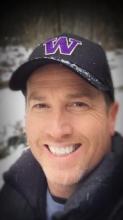We recently caught up with department alum Michael Kendrick. Kendrick graduated from UW with a BA in history in 1996, and now teaches Social Studies at Meadowdale Middle School in Lynnwood. Thanks for taking the time to answer a few questions Michael!
At what point did you decide to become a teacher?
During high school, I was able to spend time working at a summer camp in Colorado. It was there that I first experienced teaching personally. I was teaching kids rock climbing, horsemanship, river rafting. I realized then that I had a gift for connecting with kids?seeing the light in their eyes when something 'clicked' was truly amazing. I knew then that the qualities I had seen and admired in my dad were ones that I possessed as well.
Did you always plan to teach history and social-studies?
Another thing my dad encouraged was my love for history. As a young child, he would take my siblings and me on dozens of trips throughout Washington, British Columbia and the Yukon Territory. We would explore old mines, scuttled paddlewheels, hunting cabins and gold rush towns, discovering, learning and sharing in the rich and diverse history our area. On several occasions, we found old artifacts, like an old bottle or a hammered nail. It was like finding buried treasure.
I found myself driven to know more about how and why settlers had lived in these areas. I also knew that I wanted to share this information with others, helping them to feel the same kind of excitement and connection to history. Although at that time, I am not sure that I yet realized that teaching would be the way I would eventually share the power of history with others.
What did you most enjoy about studying history?
As a kid, as my fascination with history grew, I would read historical fiction and non-fiction books, watch documentaries on PBS, and I would often imagine myself living in historical time periods. I began to see history as a story: one filled with heroes and villains, sometimes one in the same. I found that by better understanding history, and from varying perspectives, I could better understand the world around me.
Then, as a student at UW, I soon discovered that history was much more complicated and fascinating than I had previously imagined. I started putting pieces together and realized that history is truly a reflection of the human condition, one where a million voices all whisper, screaming to be heard. As a historian and teacher, I am able to give them a voice and let their stories be shared.
What is something that you learned taking history classes at UW that has stuck with you?
I think the one piece of learning that has stuck with me over time has been the inclusivity of the historical narrative. In high school, the vast majority of what I learned was through a Eurocentric lens; basically, old dead white guys. I realized that very little time was spent on the historical contributions of women, people of color, or the many cultures that have molded and shaped our world and who truly represent our historical story.
Being Chicano, I never saw myself, or the culture of my mother, reflected in my history classes. It wasn't until classes at UW that I realized that history wasn't one story, but rather, thousands of stories that needed to be told. I finally began to make connections of my heritage in what I was learning. I felt that been lied to, and now, the truth was mine to examine.
I strive today to teach my Washington State history classes in an inclusive manner, ensuring that every student can see their cultural, religious and ethnic backgrounds represented.
What do you see as the place of history in modern education?
History teaches us to look critically at what is happening in the world; to analyze people and events for economic, cultural, and religious bias; to use evidence to seek out the truth, come to educated conclusions and be able to defend those conclusions. As a teacher I teach my students these very important skills, and emphasize the power of evidence based conclusions. I believe that it has never been more important than today to use these essential skills to navigate our political, social and economic discourse.
What challenges does history face in our schools?
We are currently devaluing history and marginalizing its many lessons. An example of this is in state and federal standardized testing, which places its primary focus on reading and writing and science, but not on economics, civics, and history. For a democracy to survive we need an informed voting base that understands their civic duty and can express it through the political progress. But sadly many schools have slashed social studies to the point where the first class they take is in middle school.
In my class I emphasize the power, importance and relevancy of history in our world today, and in the futures of my own students. Human nature remains essentially the same throughout history?the thing that changes is the technology around us. We can better understand the world around us by analyzing successes and failures gleaned from past narratives.
What have you found most rewarding about pursuing a career in history education?
Every day I challenge my students to think critically about the world around them, and to create a safe space for all students can find their academic voice. My favorite moments are when a student challenges something I have taught or ask a probing question to come to a different conclusion. I also love it when kids delve into primary sources and uncover history through them. Students need to see that history is alive and is all around them and it encompasses every aspect our existence.
